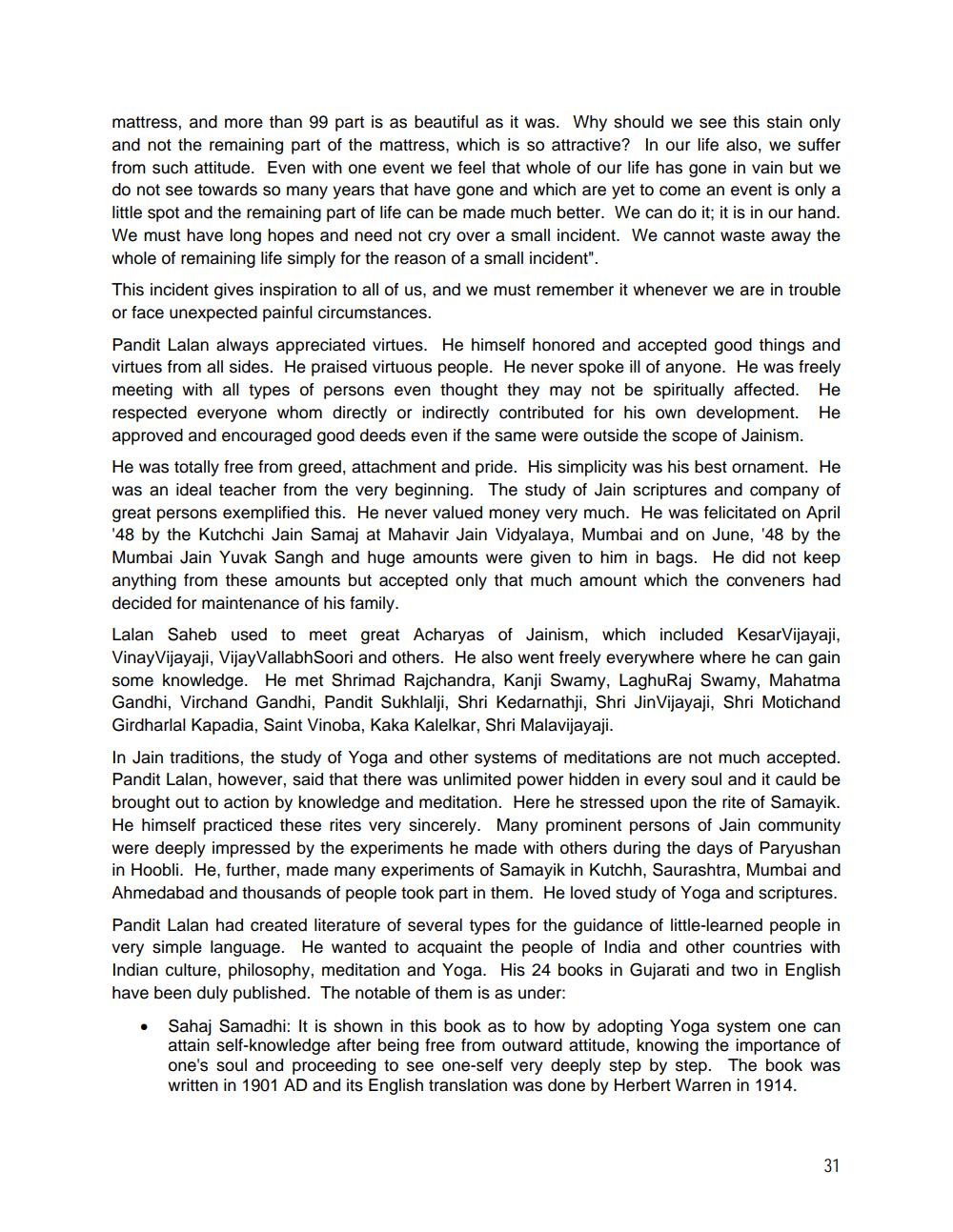________________
mattress, and more than 99 part is as beautiful as it was. Why should we see this stain only and not the remaining part of the mattress, which is so attractive? In our life also, we suffer from such attitude. Even with one event we feel that whole of our life has gone in vain but we do not see towards so many years that have gone and which are yet to come an event is only a little spot and the remaining part of life can be made much better. We can do it; it is in our hand. We must have long hopes and need not cry over a small incident. We cannot waste away the whole of remaining life simply for the reason of a small incident". This incident gives inspiration to all of us, and we must remember it whenever we are in trouble or face unexpected painful circumstances. Pandit Lalan always appreciated virtues. He himself honored and accepted good things and virtues from all sides. He praised virtuous people. He never spoke ill of anyone. He was freely meeting with all types of persons even thought they may not be spiritually affected. He respected everyone whom directly or indirectly contributed for his own development. He approved and encouraged good deeds even if the same were outside the scope of Jainism. He was totally free from greed, attachment and pride. His simplicity was his best ornament. He was an ideal teacher from the very beginning. The study of Jain scriptures and company of great persons exemplified this. He never valued money very much. He was felicitated on April '48 by the Kutchchi Jain Samaj at Mahavir Jain Vidyalaya, Mumbai and on June, '48 by the Mumbai Jain Yuvak Sangh and huge amounts were given to him in bags. He did not keep anything from these amounts but accepted only that much amount which the conveners had decided for maintenance of his family. Lalan Saheb used to meet great Acharyas of Jainism, which included Kesar Vijayaji, Vinay Vijayaji, Vijay Vallabh Soori and others. He also went freely everywhere where he can gain some knowledge. He met Shrimad Rajchandra, Kanji Swamy, LaghuRaj Swamy, Mahatma Gandhi, Virchand Gandhi, Pandit Sukhlalji, Shri Kedarnathji, Shri Jin Vijayaji, Shri Motichand Girdharlal Kapadia, Saint Vinoba, Kaka Kalelkar, Shri Malavijayaji.
In Jain traditions, the study of Yoga and other systems of meditations are not much accepted. Pandit Lalan, however, said that there was unlimited power hidden in every soul and it cauld be brought out to action by knowledge and meditation. Here he stressed upon the rite of Samayik. He himself practiced these rites very sincerely. Many prominent persons of Jain community were deeply impressed by the experiments he made with others during the days of Paryushan in Hoobli. He, further, made many experiments of Samayik in Kutchh, Saurashtra, Mumbai and Ahmedabad and thousands of people took part in them. He loved study of Yoga and scriptures.
Pandit Lalan had created literature of several types for the guidance of little-learned people in very simple language. He wanted to acquaint the people of India and other countries with Indian culture, philosophy, meditation and Yoga. His 24 books in Gujarati and two in English have been duly published. The notable of them is as under:
•
Sahaj Samadhi: It is shown in this book as to how by adopting Yoga system one can attain self-knowledge after being free from outward attitude, knowing the importance of one's soul and proceeding to see one-self very deeply step by step. The book was written in 1901 AD and its English translation was done by Herbert Warren in 1914.




